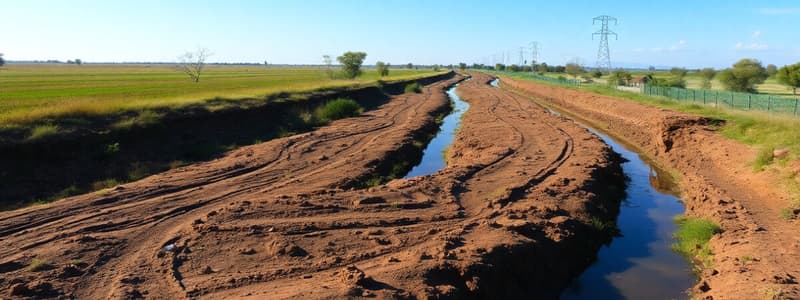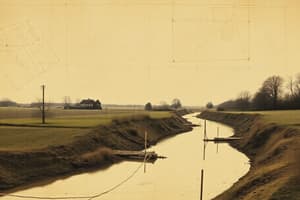Podcast
Questions and Answers
Where is Nico Ditch located?
Where is Nico Ditch located?
- Cornwall, England
- Yorkshire, England
- Greater Manchester, England (correct)
- Wales
What is the approximate length of Nico Ditch?
What is the approximate length of Nico Ditch?
- 1 mile
- 12 miles
- 3 miles
- 6 miles (correct)
Nico Ditch was possibly constructed for what purpose?
Nico Ditch was possibly constructed for what purpose?
- Roadway
- Defensive fortification (correct)
- Irrigation
- Drainage system
During which period was Nico Ditch likely constructed?
During which period was Nico Ditch likely constructed?
What is the meaning of the Anglo-Saxon word micel?
What is the meaning of the Anglo-Saxon word micel?
The earliest documented reference to Nico Ditch refers to it as?
The earliest documented reference to Nico Ditch refers to it as?
In what area is a well-preserved section of Nico Ditch located?
In what area is a well-preserved section of Nico Ditch located?
What is the possible origin of the name 'Nico' for the ditch?
What is the possible origin of the name 'Nico' for the ditch?
What is the depth of Nico Ditch in the parts which have survived?
What is the depth of Nico Ditch in the parts which have survived?
The ditch runs through which park in Fallowfield?
The ditch runs through which park in Fallowfield?
What is a 'magnum fossatum'?
What is a 'magnum fossatum'?
Nico Ditch may have been a boundary between which two kingdoms?
Nico Ditch may have been a boundary between which two kingdoms?
What is the present-day status of part of the earthwork?
What is the present-day status of part of the earthwork?
What material was Nico Ditch constructed from?
What material was Nico Ditch constructed from?
Which of these towns does Nico Ditch NOT pass through?
Which of these towns does Nico Ditch NOT pass through?
As of recent studies, what shape is the profile of Nico Ditch?
As of recent studies, what shape is the profile of Nico Ditch?
According to legend, Nico Ditch was a protection against what group of people?
According to legend, Nico Ditch was a protection against what group of people?
What is the width of Nico Ditch?
What is the width of Nico Ditch?
Nico Ditch runs through which metropolitan borough?
Nico Ditch runs through which metropolitan borough?
What is the area of Ashton-under-Lyne that Nico Ditch starts?
What is the area of Ashton-under-Lyne that Nico Ditch starts?
Flashcards
Nico Ditch
Nico Ditch
A 6-mile long earthwork in Greater Manchester, England, possibly a defensive fortification or boundary marker.
Magnum Fossatum
Magnum Fossatum
The earliest documented name for Nico Ditch, meaning 'large ditch' in Latin, found in a charter from 1190-1212.
Hnickar
Hnickar
A possible origin of the name Nico, referring to an Anglo-Saxon water spirit that drowns travelers.
Nǽcan
Nǽcan
Signup and view all the flashcards
Nico Ditch's course
Nico Ditch's course
Signup and view all the flashcards
Nico Ditch Purpose
Nico Ditch Purpose
Signup and view all the flashcards
Legend of origin
Legend of origin
Signup and view all the flashcards
False Etymology
False Etymology
Signup and view all the flashcards
Archaeological Conclusion
Archaeological Conclusion
Signup and view all the flashcards
Visible Sections
Visible Sections
Signup and view all the flashcards
Protected Segment
Protected Segment
Signup and view all the flashcards
Study Notes
- Nico Ditch is a 6 mi (9.7 km) linear earthwork.
- It stretches between Ashton-under-Lyne and Stretford in Greater Manchester, England.
- The earthwork was created between the 5th and 11th centuries.
- It served either as a defensive fortification or a boundary marker.
- Surviving sections of the ditch measure 4–5 yards (3.7–4.6 m) in width and up to 5 ft (1.5 m) in depth.
- A portion of the earthwork holds status as a Scheduled Ancient Monument.
Etymology
- The ditch's earliest mention is in a charter from 1190 to 1212.
- It details land grants in Audenshaw to Kersal Cell monks, labelled as "Mykelldiche" and magnum fossatum, Latin for "large ditch".
- The name Nico (or Nikker) became common in the 19th and 20th centuries.
- Nico might come from the Anglo-Saxon Hnickar, a water spirit.
- More likely, Nico is a changed form of Mykelldiche, where micel means "big" in Anglo-Saxon.
- An alternative origin for Nico is the Anglo-Saxon verb nǽcan, which means "to kill".
Course
- The ditch runs for 6 mi (9.7 km) from Ashton Moss to Hough Moss, east of Stretford.
- It traverses Denton, Reddish, Gorton, Levenshulme, Burnage, Rusholme, Platt Fields Park, Withington, and Chorlton-cum-Hardy.
- The ditch crosses four metropolitan boroughs in Greater Manchester.
- It marks boundaries between Stockport and Manchester, also Tameside and Manchester.
- The ditch reaches Denton golf course, with a section now under Audenshaw Reservoirs, built in the late 19th century.
- The ditch might have stretched west beyond Stretford to Urmston
History
- The earthwork dates to between the 5th century and the Norman conquest in 1066.
- The earthwork's purpose is speculated to be a defensive fortification or boundary.
- It may have defined a 7th-century boundary for Anglo-Saxon expansion or a boundary between Mercia and Northumbria in the late 8th or early 9th century.
- Northumbria, Mercia, and Wessex battled for control of North West England during the early medieval period, along with the Britons and Danes.
- The ditch has served as a boundary since at least the Middle Ages.
- Legend says the inhabitants of Manchester built Nico Ditch in a single night as protection against Viking invaders in 869–870.
- Each man was assigned an area to dig and build a bank as tall as himself.
- 19th-century folklore suggests a battle between Saxons and Danes occurred at the ditch.
- This battle supposedly gave the names to Gorton ("Gore Town") and Reddish ("Red-Ditch"), but historians dismiss this idea.
- The names Gorton and Reddish actually mean "dirty farmstead" and "reedy ditch."
- Antiquarians and historians have shown interest in the ditch since the 19th century.
- Much of the ditch has been built over.
- From 1990 to 1997, the University of Manchester Archaeological Unit excavated parts of the ditch in an attempt to determine its age and purpose.
- Investigations revealed that the bank north of the ditch is of 20th-century origin.
- The ditch has a U-shape, suggesting it served as a boundary marker rather than a military defense.
- The project concluded that the ditch was likely a boundary marker.
Preservation
- The ditch is still visible in sections, measuring 4–5 yards (3.7–4.6 m) wide and up to 5 ft (1.5 m) deep.
- A 330-yard stretch through Denton Golf Course and a section in Platt Fields Park are the most well-preserved remains.
- A 150-yard segment of the ditch in Platt Fields was protected as a Scheduled Ancient Monument in 1997.
- The rest of the ditch is not protected.
Studying That Suits You
Use AI to generate personalized quizzes and flashcards to suit your learning preferences.




